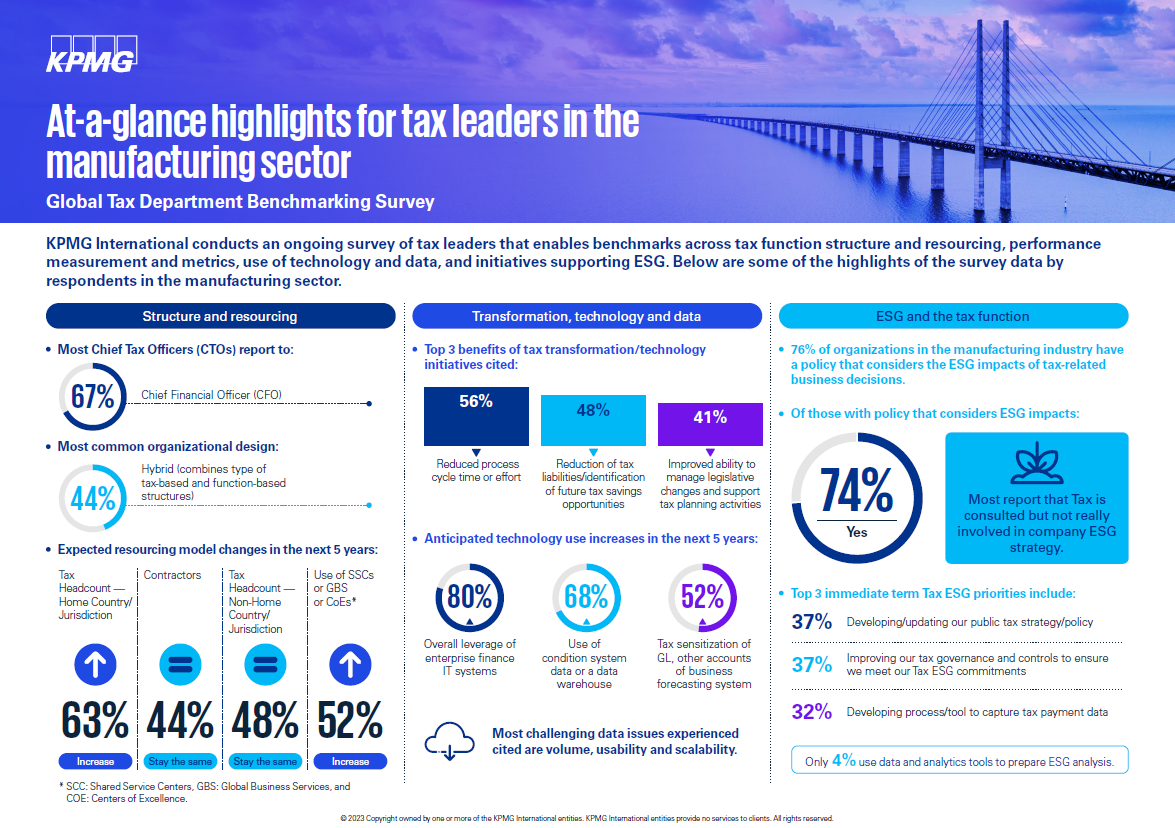How does your tax function stack up?
Seasoned tax leaders in the manufacturing sector make key decisions every day to evolve their tax function and keep pace with evolving pressures, disruptive technological advancements, heightened compliance obligations and more — all while seeking to demonstrate value within the organization and beyond.
Benchmarking against comparable manufacturing tax functions can be a powerful tool for reflecting on your organization's current position and planning how to prepare for the future. To help, KPMG International conducts an ongoing survey of the tax functions in multinational organizations around the world. The data gained offers insights into tax functions globally and how they are evolving in their structure, governance, priorities and performance measures, through the use of technology and more.
In this at-a-glance summary, we provide a look at some of the key findings relating to tax function structure and resourcing, transformation, technology and data, and ESG from survey respondents in the manufacturing sector.
KPMG Perspective:
Tax functions focus on people and technology investment to tackle unsteady supply chains, stakeholder expectations and tax reform
Survey responses from tax leaders in the manufacturing sector paint a picture of an industry facing significant change. In particular, multinational industrial manufacturing companies continue to be challenged with supply chain disruptions and are looking to diversify these production networks to enhance resiliency and to decrease dependencies on single country sourcing (e.g., China plus 1). With these organizations seeking insights, capabilities, and resources in the areas of value chain management, transfer pricing and trade & customs, the survey revealed their propensity to increase headcounts in their home countries, and through the use of shared service centers. The survey also highlights their desire to invest in technology transformation to streamline processes and better manage tax obligations. However, they acknowledge the challenges of leveraging data due to volumes, usability, and scalability.
The survey also hints strongly at the increased scrutiny these companies are encountering from investors, shareholders, regulators, and customers, specifically to address ESG matters. With heightened stakeholder expectations that companies can effectively report on their environmental impact and remediation activities, tax leaders expressed significant interest in strengthening their function’s ability to track and respond to these issues in a sophisticated manner. It is noteworthy that, when compared to other major sectors, more manufacturing organizations reported that they already maintain policies relating to ESG impacts on tax decisions. That said, they point to remaining gaps in their capabilities, including updated tax strategy policy, controls and process tools.
These companies are also attuned to the need to fortify their tax compliance and tax planning efforts in the wake of myriad enacted tax and regulatory legislation and frameworks, ranging from OECD Pillar I and II, ATAD 3, to the Inflation Reduction Act (IRA), the CHIPS and Science Act, and the Infrastructure Investment and Jobs Act. It’s no surprise that more than half of respondents indicated that tax reform was their top disruptor last year, and many indicted their focus on measuring their function’s performance based on effective management of tax risks and tax compliance schedules. Nearly half of survey participants hope that their transformation programs will improve their ability to manage legislative change and tax planning. In tandem, tax leaders are focused on value creation, both by appropriately managing tax risks or supporting corporate strategy. While these issues are naturally complex, it is encouraging that tax leaders in this sector have a solid appreciation of the need to enhance their people, process, and technology capabilities in the near term to respond effectively.
Thomas Theodoropoulos
Global Tax Leader Industrial Manufacturing Sector & Senior Lead Tax Partner, KPMG in the US
Global Tax Leader Industrial Manufacturing Sector & Senior Lead Tax Partner, KPMG in the US

Related content
Special focus reports
Additional sector highlights
Connect with us
Thomas Theodoropoulos
Global Tax Leader Industrial Manufacturing Sector and Senior Lead Tax Partner
KPMG in the U.S.













